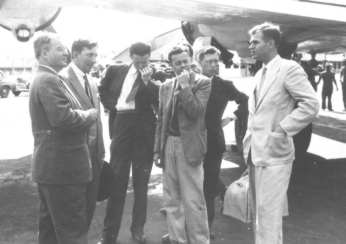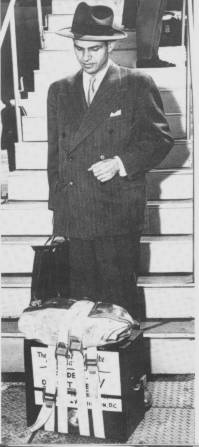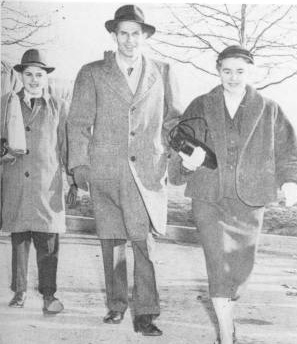A Brief Biography

Supreme Court Justice Oliver Wendell Holmes and Alger Hiss at the Justice’s summer home in Beverly Farms, June 1930.
Alger Hiss was born on November 11, 1904 in Baltimore, Maryland, the fourth of five children. In 1907, his father, an executive with a dry goods firm, experienced severe financial difficulties and committed suicide, leaving the children to be raised by their mother and aunt.
Hiss attended Johns Hopkins University and then Harvard Law School, where he came under the influence of future Supreme Court Justice Felix Frankfurter. He graduated from law school in 1929, and immediately thereafter, on Frankfurter’s recommendation, received the honor of becoming Supreme Court Justice Oliver Wendell Holmes’s private secretary. Hiss would later say Holmes was the most profound influence in his life.
After his one-year appointment, Hiss joined the law firm of Choate, Hall & Stewart in Boston, Massachusetts. The next year, he and his wife, Priscilla, whom he had married in 1929, and his stepson, Timothy Hobson, born in 1926, moved to New York, where Priscilla worked on a book while Hiss joined another law firm. He stayed with that firm – Cotton, Franklin, Wright & Gordon – until 1933, when he received a telegram from Frankfurter, saying the country needed him. The telegram urged him to join the New Deal as an attorney with the Agricultural Adjustment Administration, a program set up by FDR to help farmers who had been hurt by the Depression.
In 1934, Hiss’s services were loaned out to the Nye Committee of the U.S. Senate, which was investigating profiteering by the munitions industry. During this time, New Deal legislation was constantly under attack by conservatives, and, as a lawyer, Hiss became a point man whose specialty was defending the constitutionality of the new reforms. When the Nye Committee work was completed, he joined the Justice Department as special assistant to the Solictor General to help defend the AAA before the Supreme Court. The following year, he entered the Trade Agreements division of the State Department, as special assistant to Assistant Secretary of State Francis B. Sayre, to gain firsthand experience that would help the government defend the constitutionality of the Trade Agreements Act.
In 1939, Hiss became assistant to Stanley Hornbeck, the State Department’s Political Adviser for Far Eastern Affairs. Two years later, his son Tony was born. In 1944, as World War II was drawing to a close, he helped prepare for peace. As deputy director of the Department’s Office of Special Political Affairs, he assisted in drafting the structure of a proposed United Nations. Later that year, he was Secretary General of the Dumbarton Oaks Conference, which created much of the final blueprint for the U.N. Charter.

Alger Hiss (at right) with State Department colleagues en route to the Yalta Conference, February, 1945.
In 1945, while serving as a member of the American delegation to the Yalta Conference, Hiss was named Director of the Office of Special Political Affairs. Later that year, he was Secretary General of the San Francisco Conference that organized the United Nations. After the conference – as the highlight of his government career – Hiss was asked to fly the new U.N. charter back to Washington in a special plane for President Truman’s signature. “That was the day,” Hiss said later, “when I realized exactly how important I really was – the charter had a parachute and I didn’t.”

Alger Hiss flies the United Nations charter to Washington, D.C. after the San Francisco Conference on a special plane for President Truman’s signature. (The charter, unlike the plane’s passenger, had its own parachute.)
Hiss left the government in late 1946 to become president of the Carnegie Endowment for International Peace, a New York-based foundation which under his leadership became a leading supporter of the U.N. He was serving in that capacity in 1948 when Whittaker Chambers, testifying before the House Un-American Activities Committee (HUAC), first publicly accused Hiss of being a secret communist. Hiss denied the charge and filed a libel suit against Chambers, but when Chambers produced a number of copies of State Department documents and said they had been given to him in 1938 by Hiss for transmission to the Soviet Union, perjury charges were brought against Hiss for denying before a grand jury that he had committed espionage.
The Hiss-Chambers affair would prove to be one of the most important criminal cases of the century and the watershed event that that led directly to the McCarthy period.
A first trial ended in a hung jury, but Hiss, who firmly maintained his innocence, was convicted in a second trial. He served 44 months in jail before his release in November 1954.
When he left prison, the other inmates stood at the windows to cheer him, something that had happened only once before, when Eugene V. Debs left jail in 1921. Hiss in later years reported that, for him, prison had been a place of learning and growing, saying that “three years in jail is a good corrective for three years at Harvard.”

Alger Hiss leaves prison on November 27, 1954, flanked by Tony and Priscilla Hiss.
As a disbarred lawyer, Hiss took a job as a salesman, and wrote In the Court of Public Opinion, in which he rebutted the government’s case point by point.
Alger and Priscilla Hiss separated in 1959. He continued to assert his innocence and amass new evidence to back his claim, including some 40,000 pages of FBI documents that were released to him in the 1970s under the Freedom of Information Act (FOIA). Based on information in these documents suggesting that the FBI had hidden evidence that would have helped clear him, Hiss in 1978 filed a petition of coram nobis in federal court, asking that the verdict in his case be overturned due to prosecutorial misconduct. The petition was turned down, and appeals were unsuccessful. In 1975, however, to his enormous personal satisfaction, Hiss was readmitted to the Massachusetts bar – the first disbarred lawyer ever reinstated in that state.
Hiss married his second wife, Isabel Johnson, in 1986. Two years later, he wrote his autobiography, Recollections of a Life. His grandson, Jacob Hiss, was born in 1991. Alger Hiss died at the age of 92 on November 15, 1996, still fighting for vindication.
In 1960, six years after leaving prison, Alger Hiss was for the only time in his life the subject of a full-length magazine profile, which ran in Esquire that December. Its author, Brock Brower (1931-2014), a Rhodes Scholar, became celebrated for his celebrity and political profiles (Norman Mailer, Mary McCarthy, Hubert Humphrey, Ted Kennedy, even Richard Nixon), and was later a novelist nominated for a National Book Award and then a speech writer for Richard Thornburgh, Attorney General under President George H. W. Bush.
